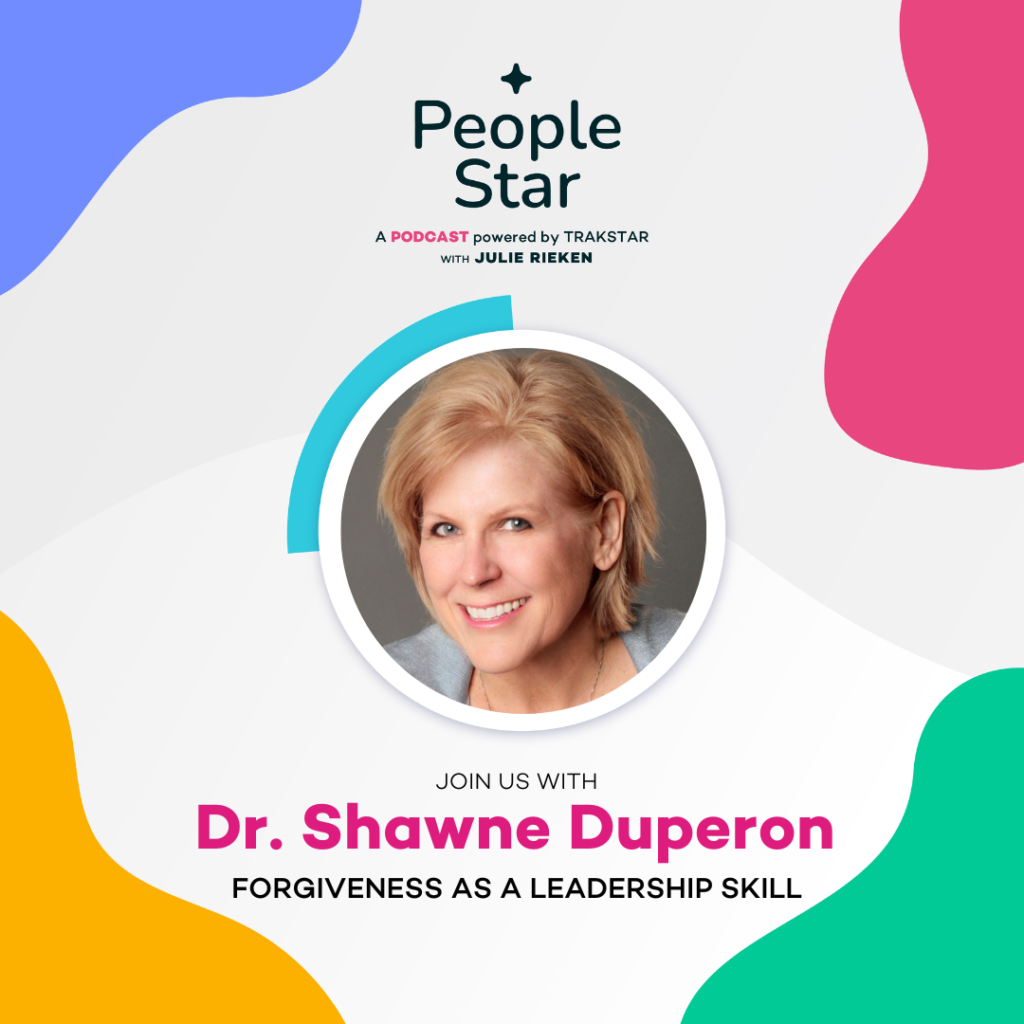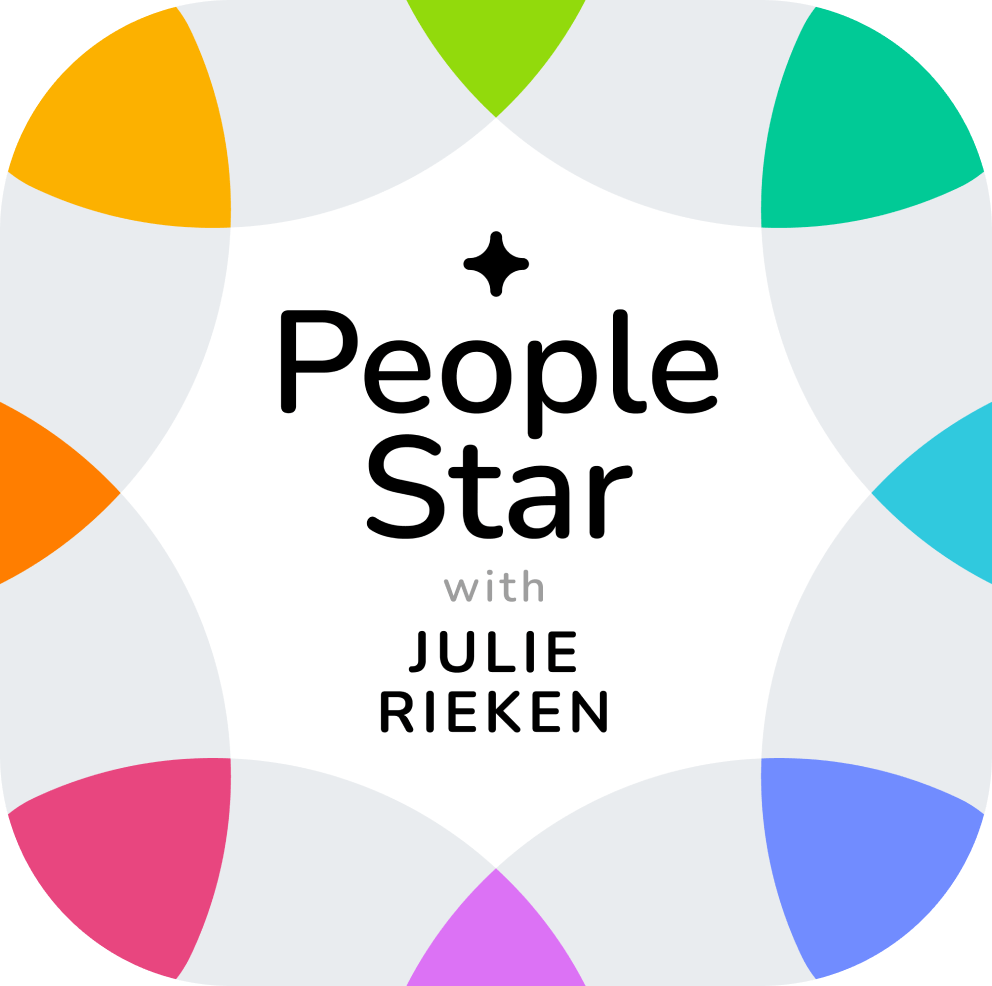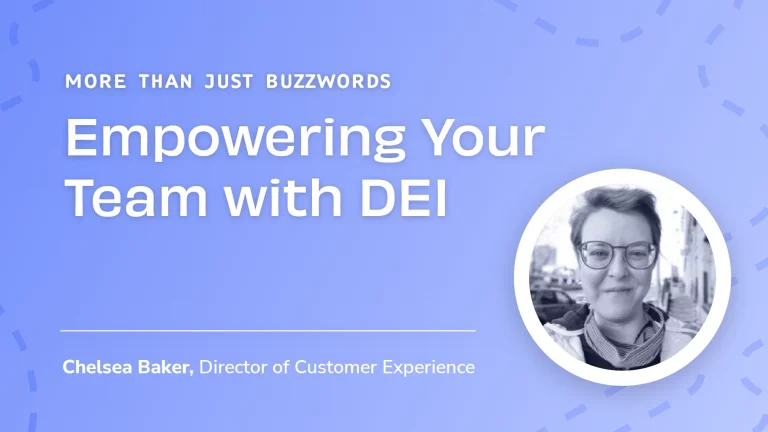PeopleStar_Dr Shawne Duperon: this mp3 audio file was automatically transcribed by Sonix with the best speech-to-text algorithms. This transcript may contain errors.
PeopleStar Intro/Outro:
Welcome to the PeopleStar Podcast. We deliver leadership perspectives from industry experts on their people, architecture, routines, and culture as they solve HR's newest challenges. And now your host, Julie Rieken.
Julie Rieken:
Hello podcast listeners. Julie Rieken, host of PeopleStar Podcast. Today we're going to have the coolest conversation with Dr. Shawne Duperon. And she goes by Dr. Shawne, and she, let me just give a little bit of background and then Dr. Shawne, you can give us even more. You have a PhD in communication and an expertise and good gossip, which is going to be super fun. And you help organizations effectively communicate, resulting in things that we all want for our organizations, increased engagement, retention, agility, and creativity with a specialty in forgiveness as a leadership skill. We've never talked about this, Dr. Shawne, I'm really excited for this conversation. Welcome!
Shawne Duperon:
Yay! I am tickled to be here. Thanks for having me, Julie.
Julie Rieken:
Dr. Shawne, give us a little bit of your background and then let's, then let's talk about forgiveness and good gossip. And what does that mean in the workplace? Let's help our listeners understand who you are and where you come from.
Shawne Duperon:
Sounds good. So I'm one of those old news hounds. I worked at NBC and ABC for years, and one of the things that I saw working in news was that people would come up with these amazing stories and they were really crappy on the phone, like nervous, which makes sense, right? But here's the thing, in television, if you're nervous on the phone, you're never going to make it on camera. So I thought, oh my gosh, all these amazing stories come through. What if I started my own business, taught people how to do this, taught them how to calm down and deal with their own stuff so they could get out the messaging that they really wanted to get out. And looking back now, it was like the precipice or the start of focusing on good gossip in academia. Because when, we have so many misnomers about gossip, and what if we really generated and caused conversations that made a difference? And it's one of the reasons why I picked forgiveness in the workplace, because I spent a lot of time in forgiveness in the workplace.
Julie Rieken:
Forgiveness in the workplace, this is a really interesting topic. And leaders, we might have these things every single day where we not only need to forgive ourselves, but, but people around us, whether it's our families or situations or coworkers or whatever it might be. Why did you pick forgiveness and can you just talk to us about why is this important and what, what are the benefits of it?
Shawne Duperon:
So a couple of things. All right, looking at, working in a workplace, right? So much stuff happens. You are up for promotion you're against somebody you don't really like, they're not your cup of tea, they get the job and now they're your boss, okay? That's like once, and now you've got to work with them on a team and you have stuff in the way to be able to be your fully productive, awesome, spectacular self. So that's one piece of this forgiveness, because I see it all the time as a trainer and a consultant. I see it everywhere. I see it with CPOs, they have to talk unilaterally, they have to talk up to the CEO, they have to talk, and I say down and quotes, but they have to talk to their teams. There's all these different things to manage and work through, lots of forgiveness is needed. I think of HR folks, they are probably the most underrated, underappreciated teammate in leadership. And, and the thing that I've realized is what comes with forgiveness, when you can forgive people for not getting how amazing you are or the contributions you make, how can you communicate it so you're filling those gaps of justifying your work. Now, there's no reason anyone should have to justify their work. And in business you fill gaps in communication. Like how much money would you lose if you lost somebody and had to replace them in the training fees that would have cost to keep them and retain them for two years or whatever. Like, when you can start quantifying in a position like HR or in a position like CPO, who has to justify losses and, and differences and when they're actually making purchases, you start quantifying and solutions come. So when it comes to a workplace idea, it's really about finding the gaps and communicating that value because it's not personal. They don't, people aren't devaluing you, when you really take the onus on for yourself and how to promote that value, that's when really cool things start to happen. So in a nutshell, forgiveness is seeing where the pain is, not taking it personal and where do you fill the gaps, this is specifically in the workplace.
Julie Rieken:
That's really good advice. When I think about giving forgiveness. How do you do it? What does it sound like? What does it look like?
Shawne Duperon:
Yeah, and you know, that's a great question because forgiveness is like a fingerprint, it's so unique for each of us. There's basic tenets to it. And as an academic, I've seen the three step process, ten steps to forgiveness. We created our own five phases, and they're non linear. Anger, shock, grief, acceptance, peace, and actually gratitude. Anger, shock, grief, acceptance and then gratitude. And in those five phases, you could like, let's say you didn't get the job, right? You really wanted this job, you do this promotion, and the next day you're so angry. Then the day after that, you saw that another job opportunity came up. So you're like, oh, maybe that door closed, another window will open and that could be very cool. Then you find out it's not, then you go back to anger. So in those stages you meander through all of them and everybody has their own way that they process depending upon our biology. Sometimes we have to really talk to ourselves to move through something. One of my favorites when I'm really, really angry at somebody and I can't get through it, I practice the mantra I'm forgiving myself for not forgiving them because.
Julie Rieken:
Wait, wait, wait.
Shawne Duperon:
I'm forgiving.
Julie Rieken:
Thank God. I'm forgiving myself for not forgiving that person. Did you just say that? I love it!
Shawne Duperon:
Yeah. Because pain ….., and sometimes it's so tight and just start losing it. One of the things I see over and over and over again, especially when I train in Fortune 500, is the same issue for someone comes up over and over and over again in different bodies. So your issues are your issues, and they're going to keep showing up until you actually get to a place where you can resolve them. And if you're so spot on. Julie, when you started off saying it's personal, it's business, it's personal, it's business. Sherry Huber coined the phrase how you do anything is how you do everything. And I really believe that to be true. Sherry Huber is her name. I love, love, love that phrase. And when you start having breakthroughs at home with how you're communicating, breakthroughs at work and start getting a little more compassion because people upsets are so different and we can start not taking it so personal, that's when really cool things start to happen because nothing is personal, it really isn't. I know it feels like it is, but most things are not.
Julie Rieken:
That's a good point. Let me ask you this, do you have any examples of forgiveness, whether it's an action, a business thing that maybe didn't go the right way or whether it's a personal forgiveness, I forgive this situation. What's the difference and how do you approach those two things? I guess I'm asking because let's just say that as leaders, we start an initiative and it works or it doesn't work. Is forgiveness appropriate there or is that simply acceptance? Or if it's a personal thing, again, maybe it's not, maybe it's, maybe it's not personal to your point. How do you approach those two situations, whether it's a business scenario or it's an individual thing?
Shawne Duperon:
You know, I love your question because I really do believe how you do anything is how you do everything. And we like to compartmentalize ourselves, that we're a different person at work than we are at home, than we are at church, than we're at our kids basketball game. And where true happiness or true joy comes in is when we can be our authentic selves wherever we are, it doesn't mean you're going to, it's going to sound a little odd, but like at Thanksgiving, sometimes my uncle would unbutton his pants because you're not going to unbutton your pants at work, but you're still the same person and might say, I wish I could unbutton my pants, I ate too much, okay? Might say that to a close colleague. So the game is how can you authentically be yourself in all these different arenas? And that to me is what authenticity is. That to me is what forgiveness, acceptance is, because in good gossip theory, what it really is about is how can we agree as maybe a corporate culture, what a word means. So what happens a lot, like maybe the CEO gets up and does a town hall and says, I'm going to talk about respect. And then he goes on and or she goes on and on and on about respect. Half the audience has this definition of respect the other half is this definition, and in a good gossip theory, you're coming from the same place of understanding of a word. So good gossip is 5 to 7% is malicious gossip, we're actually really good people. Gossip comes from the word God sib, meaning close to God. The doulas would deliver babies in the eighth, ninth and 10th centuries and spread the precious news that a child of God was born. Oh my goodness. You have a different frame for that word. And when you do the same thing with the word like respect, because so many people have a different definition, what a great leader will do is define the word in that moment because he's using it. And I'll give you an example and then later go back to corporate culture, let the culture define it. So let's say a CEO here he is, is doing a town hall, he's talking to all of all the employees. We're going to talk about respect. I know that's a big word, I know it has lots of definitions. Let me define it for the context with which I'm about to explain. And then he gives or she gives their definition so that everybody can be on the same page or start the conversation of being on the same page. And that's why our project Forgive is done so well, is because we clearly define these gaps of missings, of understanding and communication, so we're all on the same page. And I used, HR is a great example because you're going to have to do a lot of forgiving if you're not valued in HR, you are. And most of the time, my experience is people are not valued in HR. How do you create that value? Where do you find the missing gaps to actually insert it when you're doing a presentation or when you're showcasing something? Because it's a mindset that's going to take time, it's going to take time to do that and even think about bringing gossip into corporate. I remember 15 years ago when I had a corporate executive say to me, oh my gosh, get gossip off your website. And I'm like, no, let me educate you. Took time but I built …. Same thing with forgiveness. All it took was one executive at General Motors to see us do our thing with the apology you'll never receive. And we went off like gangbusters because people think forgiveness is Jesus, nothing against Jesus, at all. It's not religious, it's nonpartisan. Someone gets your job and now you've got to forgive them, that is the real work of forgiveness. So taking the religion out of that conversation doesn't mean you can't still be spiritual about it or have your religion about it. Let's get on the same page, forgiveness is not forgive and forget, that's a myth, so … ideas like that.
Julie Rieken:
Super great advice. Dr. Shawne, let's wrap with our HR audience and just think about how can they help leaders see forgiveness and organizations see forgiveness as a strength. Let's think about that group of people specificly since we talk to a lot of HR people here at PeopleStar, let's just think about how, how can we advise them to think about forgiveness and what, what's in it for them?
Shawne Duperon:
Yeah, it's always going to start here. And I love if I can use the tool accepting the apology you'll never receive. It's a fast story. Ready?
Julie Rieken:
I'm ready.
Shawne Duperon:
My neighbor is a jerk. I walk out to the mail. I get annoyed as soon as I see him. And he'll say things to me like Dr. Shawne, good morning. And he says it in that voice, and I want to smack him, okay? And I'll say, yeah, but Bob …., it's, it's evening, it's 6 p.m.. And he'll say something like, and this is real, this really …. He'll say, but you look like you just got off. So is that kind of annoying? We all have an annoying person in our life. We all got them. Whether it's people calling you a millennial and, you know, I hear millennials all the time talk about being hate and being called millennials, and they have to do a lot of forgiveness work. So this is the piece that we can do individually that has a wave effect. So I started practicing something that we started calling accepting the apology you'll never receive. Bob would never apologize for what he said, he lacks social skills, he doesn't have the skills, so what I would do, in my mind's eye, he was not doing this, I'd pretend he was apologizing. So I'd say in my head, oh.
Julie Rieken:
You have a powerful imagination. Continue.
Shawne Duperon:
Yes. And that's where all the power is, anyway. It really is. And I'd say to myself, because our brain thinks like that, just like when you think of a lemon, you get the taste in your lemon. Our brains are powerful. And I'd say he'd be saying to me, Dr. Shawne, I'm so sorry. Every time I see you, I get nervous. I really struggle with social skills. The truth is, I just really want you to like me. And if I were to be honest, I really want you to adore me. And I go about it the wrong way every single time, will you forgive me? That's a great one. Here's an example for a millennial. Pretending that their boss is apologizing. Oh, Cathy, I'm sorry I keep referring to you as a millennial. I so can't see that this is a stereotype that you're jumbled into a group of people, that it feels offensive to you, I just can't grasp it, and I'm working on it. Will you forgive me? HR forgiveness might be a boss saying to you, I'm so, so sorry, I don't get the emotional pitfalls that you go through, what you manage on a daily basis, having to prove your worth, having to prove your value, scraping for budget money all the time, never seeing you as a viable financial industry within our industry, and how important it is that what you do is so exquisitely important. I don't have that mindset yet. I'm looking forward to educating myself and having you educate me. Will you forgive me for devaluing? Now, this is not like a wedding, where the day before the wedding you try to lose 10 pounds the day before the wedding, it doesn't work like that, okay? It's a, it's a commitment. So just practicing one apology internally isn't going to work. I do it constantly. I have, the T-Mobile people …. me when they do customer service, and my husband will even say to me, you need me to apologize for them? It actually works. Our brains, our brains are so sophisticated. When you can get your own house in order with your own forgiveness, everything else starts to magically fall into place. That neighbor now I adore. He rarely says weird stuff to me, happens sometimes, but I'm much more calmer, loving. I'm more my authentic self instead of being that angry, annoyed person because six years ago he would have described me to other people in gossip theory, what a mean angry lady she is. And that wouldn't work being the forgiveness thing, I had to do something for myself.
Julie Rieken:
Wow.
Shawne Duperon:
You do for yourself.
Julie Rieken:
Dr. Shawne, I'm thinking of so many situations I'm going to think about after our call today. This has been so helpful, and I love it. For all of us as human beings and for HR leaders and for everybody that's listening on how to think about forgiveness and how it resides within ourselves and to, to place ourselves in a position of empathy of what does that other person maybe, maybe think or what is their intention? I love it.
Shawne Duperon:
And it's not being a doormat, it's being a thought leader and managing yourself to actually cause in a way, you have a cause …
Shawne Duperon:
People take some power in forgiveness. I hope you've enjoyed this conversation as much as I have. Dr. Shawne, this has been delightful. Thank you for being a guest.
Shawne Duperon:
What a joy to be with you. Thank you, Julie.
PeopleStar Intro/Outro:
Thanks for listening to the PeopleStar Podcast. For the show notes, transcript, resources, and more ways to get a seat at the table, visit us at TrakStar.com/Podcast.
Sonix has many features that you’d love including share transcripts, enterprise-grade admin tools, transcribe multiple languages, automated subtitles, and easily transcribe your Zoom meetings. Try Sonix for free today.




